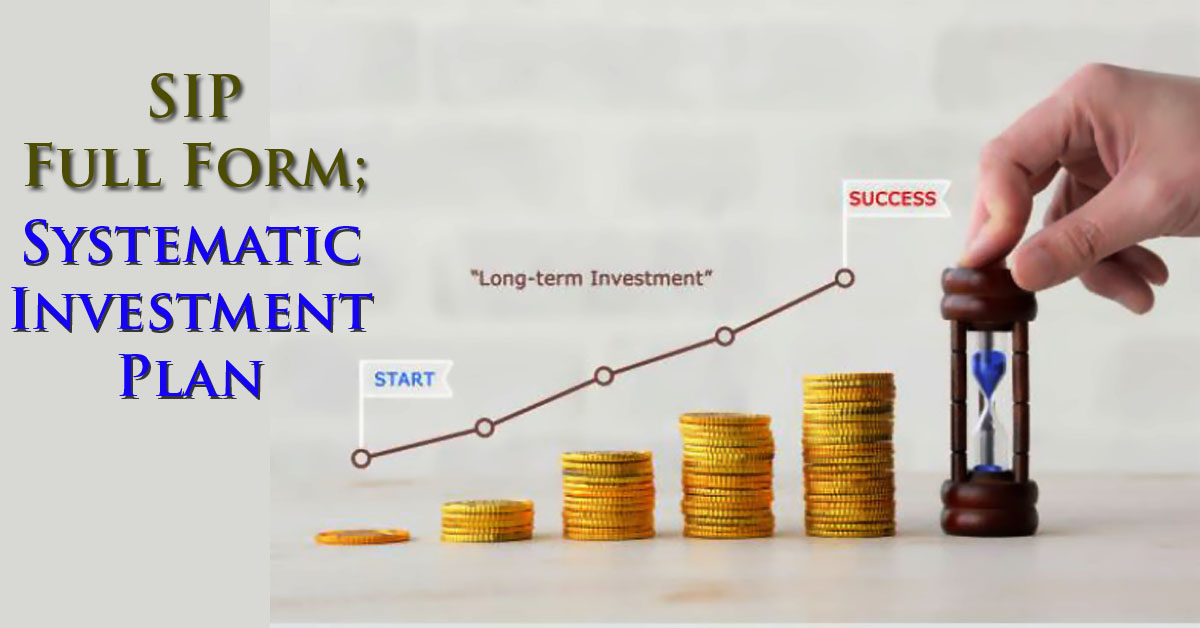SIP Full Form
SIP Full Form: The full form of SIP is a “Systematic Investment Plan”. In the context of reality, it is one of the ways to invest in mutual fund schemes. Therefore, SIP refers to investing a fixed amount regularly in mutual funds in a disciplined manner. The alternate method of investment is lump-sum investment.
The essence of SIP is that it helps you invest a fixed amount regularly in various mutual fund schemes based on your financial goals. By investing small amounts through a systematic investment plan, you have the potential to build long-term wealth. A systematic investment plan is suitable for individuals with regular cash flow or those with a fixed income.
A SIP Full Form: A systematic investment plan is the best way to inculcate the habit of regular savings and investment. Additionally, starting a SIP early gives you the advantage of harnessing the power of compounding over an extended investment horizon. Furthermore, SIP investment cushions the impact of market volatility due to the rupee-cost averaging. When the market is high, you buy fewer units, and when it’s low, you buy more units for the same amount of money.
In today’s fast-paced financial landscape, investing wisely has become a crucial aspect of securing your financial future. One of the investment tools gaining popularity among both seasoned investors and newcomers is the Systematic Investment Plan or SIP. This article explores the intricacies of SIP in a language that anyone can understand, shedding light on its benefits, drawbacks, and how it compares to mutual funds.

What Is SIP? SIP Full Form:
SIP, which stands for Systematic Investment Plan, is a form of investment that entices investors to put their money into mutual funds at regular intervals, rather than investing a lump sum. This approach is typically weekly, monthly, or quarterly. For instance, you can invest a minimum amount, let’s say $50, from your bank account every month. SIP tools play a significant role in managing your financial portfolio systematically.
Understanding SIP in Detail
SIP is a plan where small retail investors contribute regularly to their chosen scheme. A systematic investment plan allows investors to save regularly in a mutual fund scheme. Most investors buy and invest using the DCA (Dollar-Cost Averaging) strategy after proper calculations and research.
Some plans allow you to select a fixed number of shares because the amount you invest is usually fixed, not dependent on the unit or share price. An investor buys more when prices are lower and less when prices are higher.
A SIP systematic investment plan is a passive investment and not active since investors are not trading every day or making decisions continually. In simple terms, once you put your money into the plan, you can continue to invest without worrying about how it performs. This is why it’s essential to keep an eye on how much you’ve earned or deposited. As soon as you reach your desired goal, you should reconsider or modify your investment plans. A strategy plays a crucial role here, so try new strategies and move towards a strategy that needs active attention, which can boost your money quickly. But always consult with family, friends, and experts before making any active decisions.

How to Calculate SIP?
To calculate SIP (Systematic Investment Plan), follow these four steps, which provide accurate results:
1. What Will Be the SIP Amount?
Depending on the customer’s income structure and risk-taking capacity, this can vary; hence, the customer can enter any amount according to their wishes, and then they will have to withdraw that predetermined amount monthly or quarterly.
2. How Many Months Can You Continue SIP?
This depends on the customer’s desire to pay how many SIP payments.
3. How Many Months Ago Did the Customer Start SIP?
If a customer has already started an SIP and has an existing SIP, then they will have to enter the number of payments already made. Or, if the customer has not started SIP, they will have to enter zero.
4. What Is the Expected Rate of Interest per Year by the Customer?
Firstly, when someone is investing, their aim is to earn a good return in mutual funds. By entering some details, the customer can make their decision after which the SIP calculator will give precise results. With all this in view, the customer can calculate the return on their investment with the SIP calculator.
Benefits of SIP
SIP is pocket-friendly. It makes investing in small amounts at regular intervals manageable, whether it’s weekly, monthly, or quarterly.
SIP focuses on Rupee-Cost Averaging. When it comes to low-cost investment plans, SIP performs better. When prices are low, you can buy more mutual fund schemes, and similarly, when prices are high, you can buy a few mutual fund schemes. This creates a good balance between the average cost of rupees.
SIP is more effective for future planning. Everyone has their goals for the future, such as buying a home, buying their dream car, planning a systematic life, and effective goal planning is included in all of them.
The power of compounding with a long-term investment like SIP. It enables you to accumulate your invested money, suppose you have invested money for 20 years with SIP and expect a 15% return per annum, then your money becomes approximately $150,000.

Understanding the Power of Compounding
Compound interest is not just a concept but rather a phenomenon where investors earn interest on their investments.
- SIP vs. Mutual Funds
Mutual funds are investment vehicles composed of stocks, bonds, money market instruments, or a combination of these assets. They are professionally managed by financial institutions that pool money from various investors to buy securities.
While SIP is a tool used for investing in mutual funds, it differs in that it assists small investors in saving small amounts regularly and accumulating wealth over a more extended period.
- Drawbacks of SIP
While SIPs can help create a disciplined savings plan, they come with certain terms and conditions. Typically, systematic investment plans require a long-term commitment, usually from 10 to 25 years. Starting a systematic investment plan can be costly.
Conclusion
In conclusion, SIP (Systematic Investment Plan) is a smart way to enter the world of investments. It offers the flexibility to invest small amounts of money regularly, which can lead to substantial wealth creation in the long run. However, it’s essential to approach SIP with a clear understanding of your financial goals and risk tolerance. Consulting with financial experts and staying updated on your investment’s performance is key to making the most of SIP. So, if you’re looking to embark on your investment journey, consider SIP as a viable option.
FAQs
1. Is SIP a safe investment?
SIPs are generally considered a safe and systematic way to invest in mutual funds. However, like all investments, they come with some degree of risk. It’s essential to choose the right mutual funds and assess your risk tolerance before starting an SIP.
2. Can I change my SIP amount or frequency?
Yes, you can change your SIP amount and frequency, depending on the terms and conditions of the mutual fund scheme you’ve invested in. Most mutual funds offer flexibility in this regard.
3. What is the minimum investment required for SIP?
The minimum investment amount for SIP can vary depending on the mutual fund scheme. It can be as low as $50 per month in some cases.
4. How long should I continue my SIP?
The duration of your SIP should align with your financial goals. Some investors continue SIPs for 10 to 25 years or even longer to achieve their objectives.
5. Is it advisable to start a SIP for short-term goals?
SIPs are generally more suitable for long-term financial goals, such as retirement planning or wealth accumulation. For short-term goals, other investment options might be more appropriate.
Invest wisely, and your financial future will thank you!









